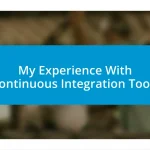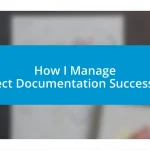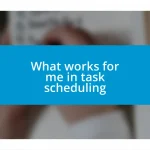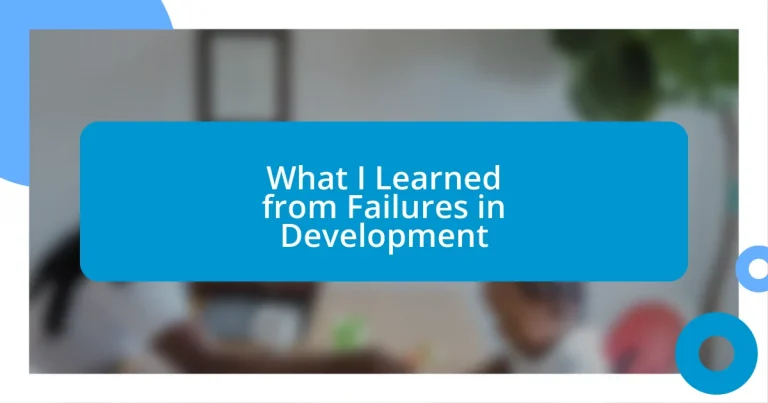Key takeaways:
- Failure is an opportunity for growth and innovation; setbacks can reveal strengths and lead to necessary adaptations.
- Collaboration and feedback are crucial in overcoming challenges; embracing diverse perspectives fosters resilience and improves outcomes.
- Creating structured recovery plans, sharing experiences, and maintaining a growth mindset transforms failures into valuable lessons for future success.
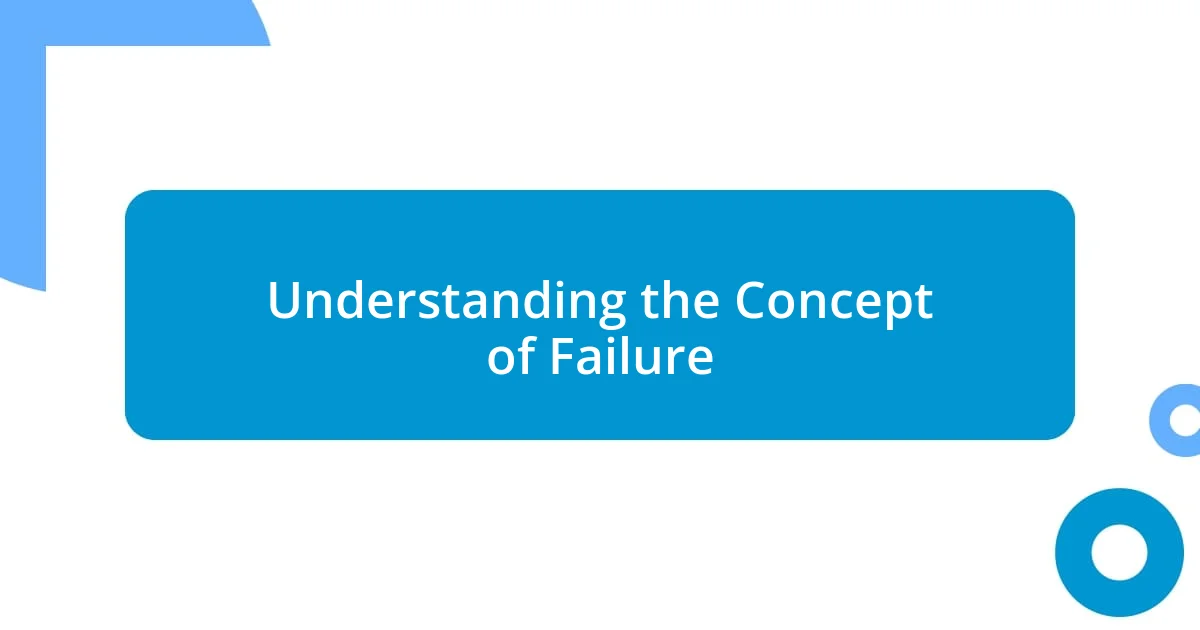
Understanding the Concept of Failure
Failure, at its core, is often misunderstood. I remember a project where I believed I had everything planned out, but unexpected issues derailed everything. That moment felt devastating, yet it sparked a realization: failure doesn’t define us; it’s a canvas for growth and self-discovery.
Reflecting on my own experiences, I’ve seen failure as a teacher, not an enemy. Sometimes, the most profound lessons come from those moments when things don’t go as planned. Have you ever considered how your setbacks might actually reveal your strengths? I have learned that in those challenging times, resilience is forged, and clarity often emerges.
It’s interesting how our perception of failure shapes our responses to it. I once felt shame after a project bombed, but later, that shame transformed into motivation and creativity. Can you relate? The truth is, each setback invites us to rethink our approach, urging us to innovate and adapt—ultimately leading to success.
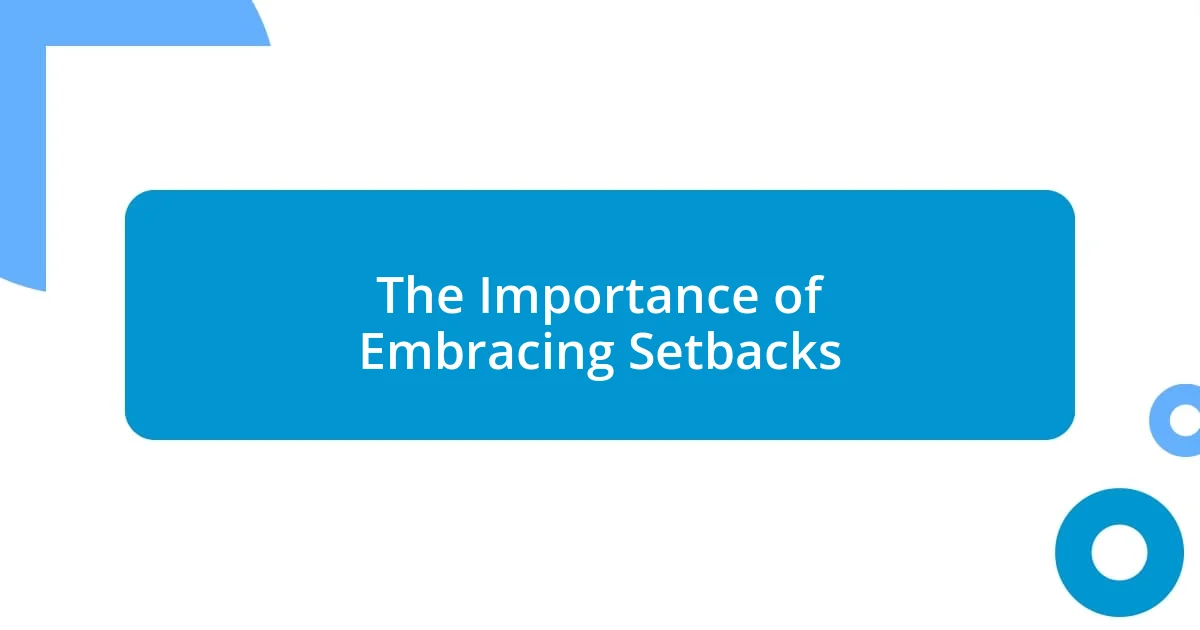
The Importance of Embracing Setbacks
Embracing setbacks has been pivotal in shaping my development journey. I recall a software launch that failed spectacularly. I felt a mix of embarrassment and frustration. However, that setback forced me to gather feedback rigorously. This led me to identify critical gaps I had overlooked. Instead of retreating, I dove into those insights, transforming my approach and ultimately delivering a much better product.
When we face setbacks, it often feels like the world is crashing down. I once had to pivot an entire marketing strategy based on poor initial results. It was a tough pill to swallow, yet it was that very moment that prompted me to collaborate more closely with my team. The discussions we had opened my eyes to fresh perspectives I hadn’t considered before. Have you ever found that a challenging experience leads to unexpected camaraderie? It’s through these setbacks that enduring relationships and innovative solutions emerge.
The beauty of embracing setbacks lies in their power to reset our priorities. I remember a time when a project fell behind due to unforeseen complications. At first, I was disheartened, but this forced me to reassess what success really meant for that project. It was a reminder to focus on what truly matters, pushing me to align my efforts with the greater vision. Isn’t it fascinating how life’s hurdles can often lead us back to our core values?
| Setback Experience | Outcome |
|---|---|
| Software Launch Failure | Identified gaps, improved product |
| Marketing Strategy Pivot | Enhanced team collaboration and innovative results |
| Project Delay | Redirected focus on core values and vision |
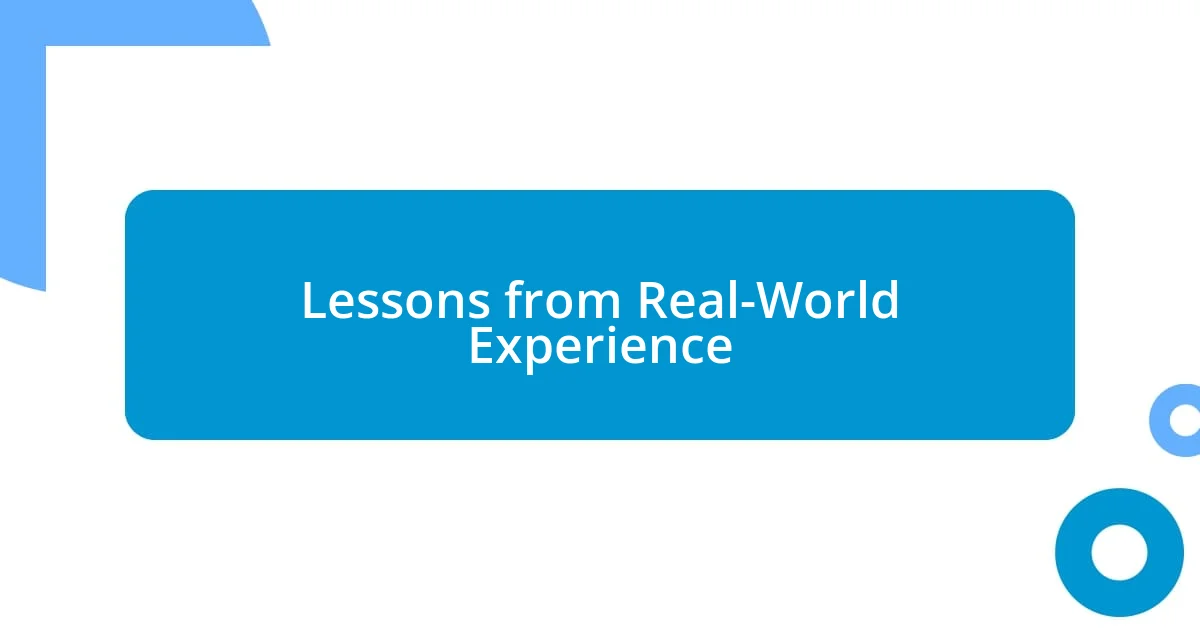
Lessons from Real-World Experience
When I think about the lessons learned from real-world failures, a powerful moment surfaces. I remember observing how my insistence on a single approach during a project stifled adaptability. It was disheartening, yet it encouraged me to embrace diverse viewpoints. This realization reshaped my approach to teamwork: valuing different perspectives became critical. It’s a skill I now prioritize, seeing firsthand how collaboration leads to innovative solutions.
Reflecting on these experiences, I see clear lessons emerge:
- Flexibility is Key: Rigid thinking can blind us to better solutions.
- Feedback Fuels Growth: Regular check-ins can unveil insights I would otherwise miss.
- Celebrate Small Wins: Acknowledging minor successes fosters positivity, even when facing setbacks.
- Seek Diverse Opinions: Different perspectives can spark ideas I hadn’t considered.
- Persistence is Vital: I learned that quitting isn’t the answer; it’s about evaluating and pivoting when needed.
The emotional journey intertwined with these lessons highlights the resilience that failure fosters. These insights shape not only our projects but also our professional relationships, creating an environment rich in support and creativity.
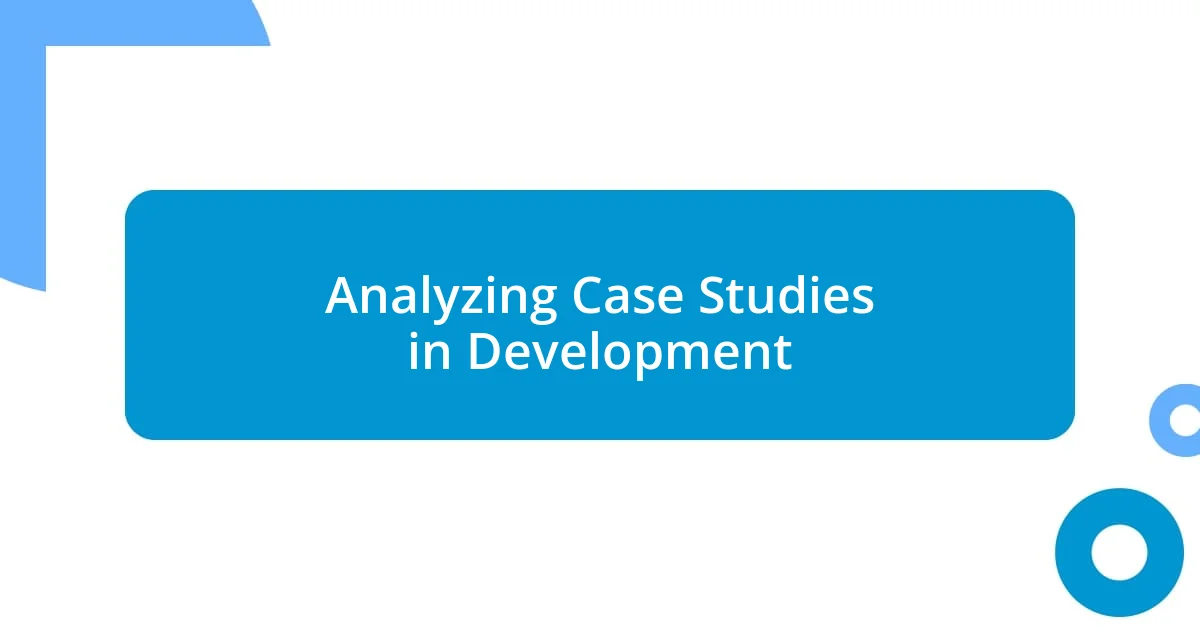
Analyzing Case Studies in Development
When I analyze case studies in development, I can’t help but reflect on my own experiences with projects that didn’t go as planned. One project involves an app designed to streamline communication within teams. Initially, I was focused solely on the features I thought users wanted. But when I observed users struggling to navigate what’s supposed to be an intuitive interface, it became painfully clear that my assumptions were off. Have you ever felt that jarring realization that we might be completely out of touch with our audience? It was through this mistake that I learned the essential lesson of prioritizing user feedback and adopting a user-centric approach.
Looking at case studies also highlights the importance of adaptability in development processes. For instance, I remember evaluating a case where a major tech firm faced backlash due to a poorly received system update. While the initial response was blunt criticism, the team’s quick pivot in addressing concerns transformed the conversation into one of appreciation. This told me that taking swift action in response to feedback is invaluable. When faced with similar criticism, I now remind myself to embrace it, seeing it not as a setback but as an opportunity for growth.
In deeper analysis, the emotional landscape of failures often reveals crucial insights. The case studies I’ve reviewed consistently showcase that learning from setbacks is rarely linear; it’s messy and fraught with emotion. I recall the anxiety I felt after launching a product that didn’t resonate with users, a feeling that lingered long after the event. But it motivated me to become more open, asking questions like “What can I learn from this” and “How can I ensure this doesn’t happen again?” Each misstep serves as a stepping stone, helping form a narrative of resilience and insight that enriches my development journey. What about you? How do you utilize the emotional fallout from your failures to fuel future successes?
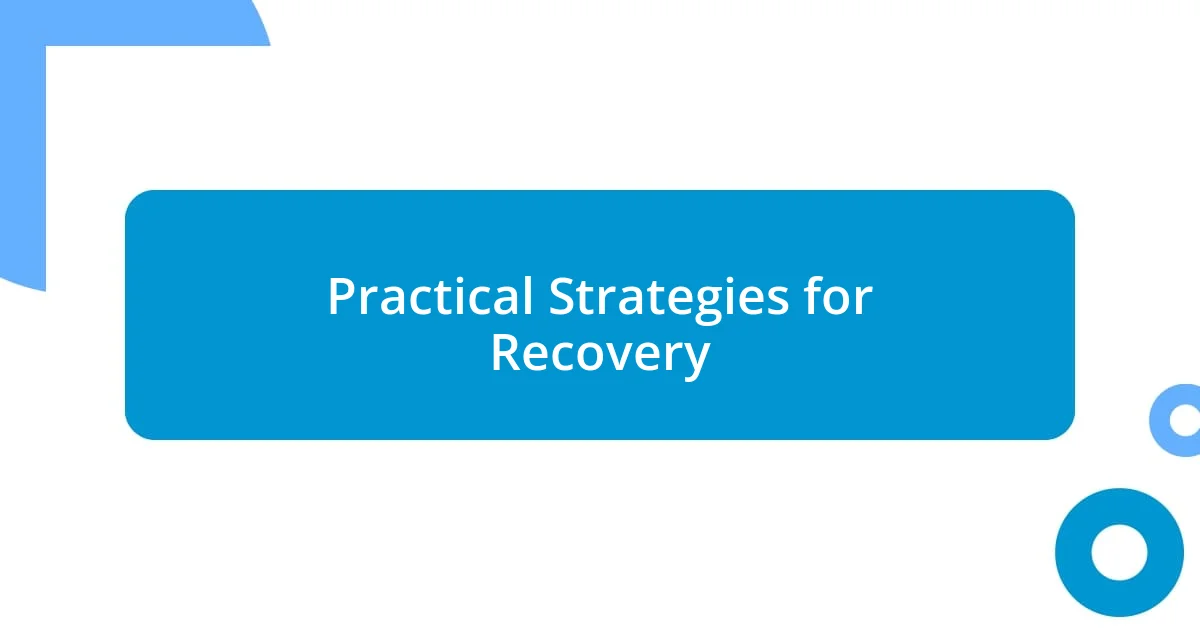
Practical Strategies for Recovery
When recovering from setbacks, I’ve found that creating a structured plan can be incredibly beneficial. For instance, after a particularly tough project fell flat, I took the time to jot down a step-by-step recovery process. This included identifying the root causes, setting clear goals, and establishing timelines. Have you ever taken a moment to map out your path after a failure? This method not only helped clarify my thoughts but also made the entire recovery feel more manageable.
Equally important is reaching out and sharing my experiences with peers. I vividly recall a time I shared my struggles during a team meeting, expecting judgment but receiving empathy instead. This openness not only lightened my emotional load but also invited valuable suggestions from others who had navigated similar challenges. I’ve learned that vulnerability can transform a daunting situation into a supportive dialogue. Isn’t it amazing how connecting with others can lead to unexpected insights?
Lastly, maintaining a growth mindset has profoundly shifted my perspective on failure. I remember the day I embraced the idea that every setback is a lesson, not a dead end. This shift in thinking allowed me to celebrate my journey, complete with all its bumps and bruises. I frequently ask myself, “What if this failure is the catalyst for something greater?” This affirmation has been a game-changer, fueling my motivation to keep pushing forward, no matter how daunting the task may seem. What strategies do you use to foster a growth mindset in your own journey?
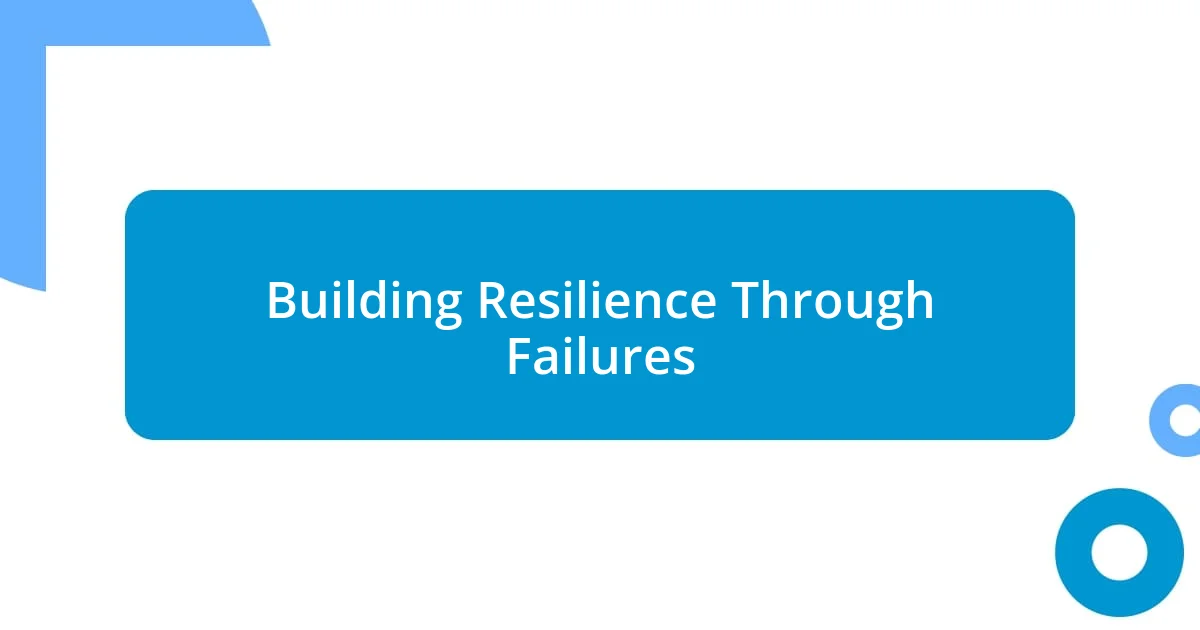
Building Resilience Through Failures
Building resilience through failures is crucial in both personal and professional growth. Reflecting on my own journey, I recall a time when a software rollout flopped dramatically. The sense of defeat was overwhelming, but as I processed those feelings, I realized that every flaw in the system mirrored a gap in my understanding of user needs. Diving into that failure unlocked a deeper sense of resilience, reminding me that each mistake is an opportunity to learn something new.
I often think about the role of vulnerability in resilience-building. Not long ago, I was on the verge of presenting a project that I believed would be a game-changer, only for it to be met with skepticism. That initial sting served as a wake-up call. Instead of hiding in disappointment, I gathered feedback from my colleagues, leading to a much stronger version of the project. It struck me then: resilience isn’t just about bouncing back; it’s about leaning into the discomfort, listening, and evolving. Have you allowed yourself to feel that discomfort?
Moreover, I’ve learned that embracing resilience means recognizing the bigger picture. After a failed initiative, I once spent days brooding over the outcome, but it dawned on me how those setbacks were merely chapters in a larger story. Those moments of doubt don’t define my journey—they enrich it. They’ve equipped me to tackle future challenges with a more open mindset and a greater appreciation for the lessons along the way. Isn’t it fascinating how our failures can become the very fabric of our future successes?
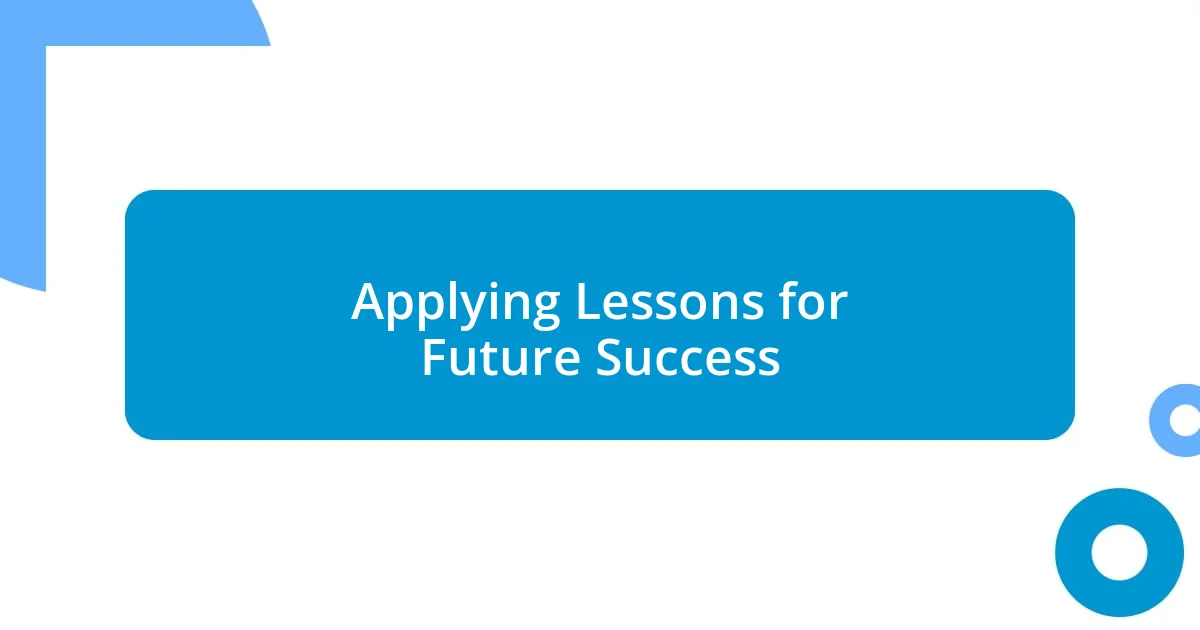
Applying Lessons for Future Success
Every setback I’ve experienced has offered me a unique opportunity to recalibrate for future success. I vividly remember a project where the code I wrote turned out to be completely inefficient. Instead of sulking over the lost time, I spent a weekend diving deep into the principles of optimization. By turning that failure into a learning moment, I equipped myself with new skills that not only improved future projects but also enhanced my confidence. Have you ever taken a failure and transformed it into a stepping stone toward something greater?
Through my journey, I’ve realized that accountability plays a pivotal role in applying the lessons learned from failures. There was a time I failed to meet a project deadline due to poor time management. Reading self-help books and sharing my goals with a mentor helped reshape my approach to responsibility and planning. This experience taught me that having a support system amplifies my learning and helps me stay committed to my growth. Who do you turn to when you need a nudge toward accountability?
Ultimately, I believe that integrating failure into my narrative has been the most powerful strategy for future success. After a particularly challenging initiative that didn’t resonate with users, I made it a point to conduct step-by-step user interviews. Those conversations were enlightening—they revealed gaps I couldn’t have identified on my own. I’ve come to understand that embracing failure doesn’t just mean moving on; it means weaving those experiences into my toolkit for better decision-making. Isn’t it remarkable how each misstep can lead to more informed choices down the road?



